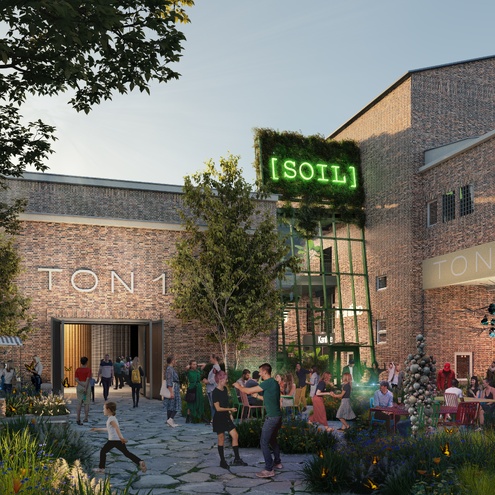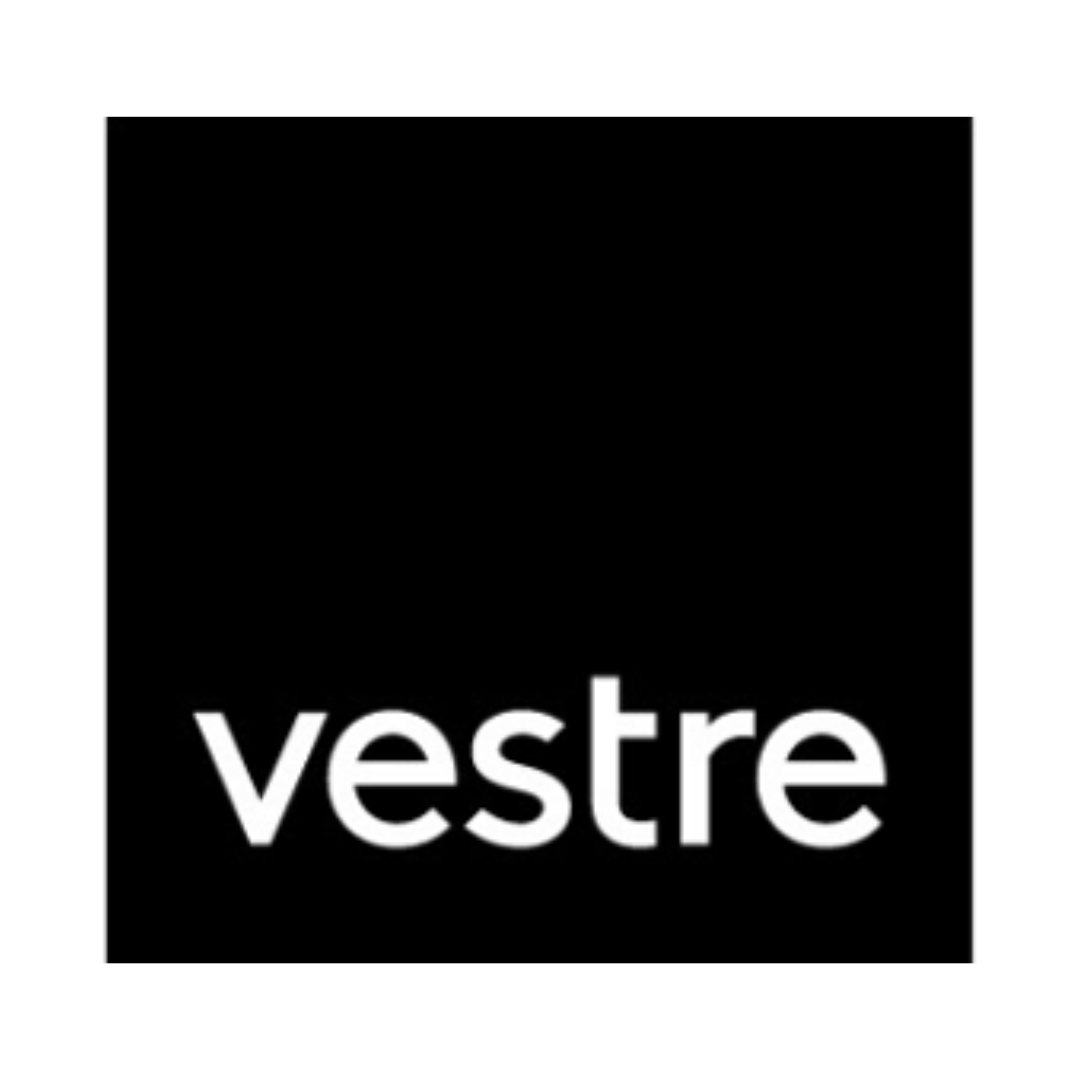Project showcase
Atelier Gardens, Berlin, Germany – Fabrix with MVRDV, Harris Bugg Studio and Hirschmüller Schindele Architekten

Berliner Union Film Ateliers (BUFA) has expanded its programme to include change-makers beyond cinema. To facilitate this, MVRDV’s masterplan opens up the dense studio campus, improving the environmental status of the buildings and greening the in-between spaces with innovative planting techniques that reduce waste.
Who is on the project team?
Fabrix
MVRDV (Masterplanner and Lead Architect) / Harris Bugg Studio (Landscape Design) / Hirschmüller Schindele Architekten (Local Architect) / Dress & Sommer (Project Manager) / Buro Happold (M&E Engineer) / Hati (Water and Material Flow Management) / KPM3 (Contractor)
Describe the context of this project?
Atelier Gardens is a 110 year-old, six-acre film studio site in Berlin being transformed into a global campus for social and regenerative entrepreneurship.
Adjoining Tempelhof Airfield, the site has been home to German cinema and television since the early twentieth century, playing host to the earliest silent movies, Alfred Hitchcock, famous productions such as Walt Disney’s Emil and the Detectives, and a dark period as a home for Nazi propaganda.
It sits just south of the city’s Circle Line, between a small industrial area which it forms part of, an old housing estate, and an upcoming residential area in the trendy district of Neukölln. All benefit from proximity to the open green space of the airfield, which is now a vast public park.
The perception of film studios is often one of glamour and the site certainly has a rich history. Known as “UFA Studios Tempelhof” and later as “Berliner Union-Film” or “BUFA”, the site’s original studio buildings once sat within a handsomely landscaped parkland, with open water and green spaces between them.
The reality now is very different – the film studios are essentially large sheds built pragmatically over time, with little thought for public realm, and transient production companies moving in and out with lorries.
Five filming studios and an assortment of ancillary buildings from a mix of periods – from listed brick studios to industrial metal sheds – sit within tarmac over contaminated soil, dominated by trucks, with no sense of public accessibility for the local community.
Please describe your approach to this future place and its mix of uses. How will it function as a vibrant place? How does it knit into and serve the needs of the wider area?
Atelier Gardens is an entirely new type of creative campus devoted to social and environmental change.
It draws on the film studio site’s rich history of story-telling, Berlin’s strong activist base, and a radical approach based on reuse, re-greening, growing a creative community and embedding the project in local context.
The campus is being reconfigured as an inspiring and flexible home to a creative and collaborative community of tenants, bound by their shared commitment to addressing pressing challenges of our time such as climate change, human rights and food production. They range from major corporates, to climate activists, to alternative higher education providers, to artists, to tech companies innovating in urban farming.
A sensitive architectural masterplan by MVRDV consolidates film-making elements within the eastern half of the site, with remaining buildings, some of which are listed, being carefully repurposed into a flexible mix of work and event spaces. Elsewhere, strategic interventions are being added to outdated office buildings and industrial-units, with rooftop pavilions, sun shading and new amenity spaces carved into existing structures.
The landscape masterplan by Chelsea gold medal-winners Harris Bugg Studio enhances the site’s spatial diversity and greening, with green plazas and rooftop gardens. Nature is being reintroduced via a radical biodiversity and re-greening strategy, with landscape specified to decontaminate the soil and materials reused, rather than going to land-fill. Large areas of hard-paving will be removed, eliminating vehicles and adding water permeability and new habitats for biodiversity.
What is the environmental impact of the project? How will the carbon use and material impact of the development be mitigated? What is the sustainability strategy?
Atelier Gardens’ holistic approach to sustainability is encapsulated by the campus’ ‘Celebrating Soil, Soul and Society’ philosophy and adaptive reuse ethos.
The project takes a historic, under-used, industrial site, with a complex mix of buildings, and makes it relevant to the needs of the times and the city it serves.
All buildings, from listed studios through to outdated offices and industrial-units, are being sustainably and thoughtfully repurposed, as opposed to demolished, enhancing spatial diversity and creating a flexible mix of work and event-space.
‘Waste’ materials, such as steel, window-frames, insulation, toilet-cubicles, doors, radiators and flooring are being reused on site or donated rather than being discarded. Zero-emission, eco-friendly materials are specified where additions and improvements are made, such as claytec boards instead of plasterboard.
Harris Bugg Studio’s pioneering landscaping strategy is renaturing the site. Planting is directly into broken hard paving, rather than sending the polluted soil or concrete to landfill. The lifted pavers are crushed to act as planting mediums, mulches and invertebrate habitats, reducing waste material to an absolute minimum.
An onsite water strategy harvests rainwater for toilets and outdoor areas, increasing infiltration and evaporation on site, and capturing and managing storm water. Waste-water will be reduced further through a pioneering reuse strategy to separate urine from solid human waste – the phosphorous used to cover the site’s fertilisation requirements.
Electricity needs will be met to a significant extent by on-site production. A total of 880kWp will be installed across nine roofs, producing around 800,000kWh electricity p/a.
Describe the social impact of the project: How will this future place contribute to the economic, environmental and social wellbeing of its citizens?
Atelier Gardens is a new, progressive and financially resilient model for sustainable development.
The vision is to rekindle the site’s pioneering and creative spirit, building a cross-disciplinary community of progressive organisations focussed on human and planetary wellbeing: activists, social entrepreneurs, documentary filmmakers, human rights lawyers, educators, growers, artists and academics.
Event and workspaces are made available at heavily reduced rates for initiatives ‘with a purpose’. Means-tested rents allows high quality affordable space for start-ups, activist groups and NGOs.
The landscaping strategy reduces the hard surfaces by 33% to transform it with an increase from seven trees and less than 1% footprint of planting, to a green and richly-ecologically campus with 170+ trees and 26% of the campus planted. 500 linear metres of vertical greening enhances biodiversity and building temperature regulation. This hugely enhanced green campus will have significant impact on physical, social and mental wellbeing.
Local social projects are integrated, including local citizen participation forums and a children’s theatre, that both benefit from space on site. An on-site zero-waste café utilising produce sourced through a ‘Community Supported Agriculture Scheme’ in collaboration with tenant Tiny Farms, is open to all. Monthly community soil fermentation workshops take local organic waste and turn it into compost for the community.
A series of public events and partnerships on the themes of ‘soil, soul, society’ activate the site’s community and increases reach, including: food and art markets with themes that highlight social issues; open-air films; and annual Human Rights Film Festival.
Festival of Pineapples
24-26 February 2026
Pineapples prize giving night
April
Pineapples at Festival of Place
10 June 2026
© The Pineapples - Tweak Ltd. 124 City Road, London, EC1V 2NX. Tel: 020 3326 7238




